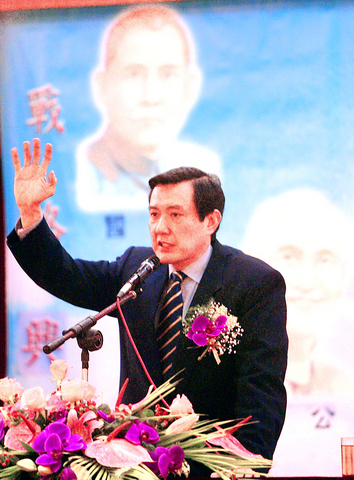The deadlock in cross-strait relations can be solved if Taiwan abides by the "1992 Consensus," Chinese Nationalist Party (KMT) presidential hopeful Ma Ying-jeou (
Ma also restated his proposal that Taiwan and China sign a truce and said he would work toward that goal if elected.
The nation should only sign such a truce if China removes all missiles targeted at Taiwan, Ma said in a speech at the Society of Strategic Studies in Taipei yesterday.

PHOTO: CNA
Ma told the audience that China posed a threat, but was also a door to new opportunities, and said it was therefore crucial for Taiwan to find a balance between the two.
"With more than 1,000 missiles aimed at Taiwan and warplanes along the coast, China is certainly a threat ... on the other hand, it also provides us with unlimited opportunities," Ma said.
China's growing economy represents unlimited opportunities to Taiwan, he said, adding that in the last year, business transactions between Taiwan and China amounted to a total of US$100 billion.
"We have to minimize threats and maximize opportunities, which cannot be achieved through conflict" he said.
The first step in avoiding conflicts, Ma said, was to recognize the "1992 Consensus."
"We have to actively work to improve our relationship with China ... and our future negotiations with China. We cannot break the 1992 Consensus," Ma said.
The KMT says that, at landmark talks held between Taipei and Beijing in Hong Kong in 1992 -- when the KMT was in power -- the two sides agreed to respect each other's interpretations of the "one China" principle.
This agreement has been termed the "1992 consensus" by the party.
However, Beijing says that Taiwan and China both agreed to adhere to the "one China" principle in 1992 and insists that Taiwan accept the principle as a condition for resuming cross-strait talks.
The Democratic Progressive Party insists that the "1992 consensus" does not exist.
February last year, KMT Legislator Su Chi (蘇起), then Mainland Affairs Council chairman, admitted that he created the term in 2000, shortly before President Chen Shui-bian (陳水扁) was inaugurated, with the aim of giving the two sides of the Taiwan Strait a "basis for dialogue."
Ma yesterday said that Taiwan's recognition of the "1992 Consensus" would increase regional stability and encourage business developments.
"Under the concept [of the 1992 Consensus] ... the two sides can sign a truce valid for decades at the least, so that Taiwan and China can continue to increase relations in peace," he said.
On the issue of the economy, Ma said he wanted to pursue a laissez-faire policy to increase cross-strait exchanges in trade, tourism, and investments, until "both sides eventually comprise a common market."
Additional reporting by CNA

Chinese Nationalist Party (KMT) Chairman Eric Chu (朱立倫), spokeswoman Yang Chih-yu (楊智伃) and Legislator Hsieh Lung-chieh (謝龍介) would be summoned by police for questioning for leading an illegal assembly on Thursday evening last week, Minister of the Interior Liu Shyh-fang (劉世芳) said today. The three KMT officials led an assembly outside the Taipei City Prosecutors’ Office, a restricted area where public assembly is not allowed, protesting the questioning of several KMT staff and searches of KMT headquarters and offices in a recall petition forgery case. Chu, Yang and Hsieh are all suspected of contravening the Assembly and Parade Act (集會遊行法) by holding

PRAISE: Japanese visitor Takashi Kubota said the Taiwanese temple architecture images showcased in the AI Art Gallery were the most impressive displays he saw Taiwan does not have an official pavilion at the World Expo in Osaka, Japan, because of its diplomatic predicament, but the government-backed Tech World pavilion is drawing interest with its unique recreations of works by Taiwanese artists. The pavilion features an artificial intelligence (AI)-based art gallery showcasing works of famous Taiwanese artists from the Japanese colonial period using innovative technologies. Among its main simulated displays are Eastern gouache paintings by Chen Chin (陳進), Lin Yu-shan (林玉山) and Kuo Hsueh-hu (郭雪湖), who were the three young Taiwanese painters selected for the East Asian Painting exhibition in 1927. Gouache is a water-based

Taiwan would welcome the return of Honduras as a diplomatic ally if its next president decides to make such a move, Minister of Foreign Affairs Lin Chia-lung (林佳龍) said yesterday. “Of course, we would welcome Honduras if they want to restore diplomatic ties with Taiwan after their elections,” Lin said at a meeting of the legislature’s Foreign Affairs and National Defense Committee, when asked to comment on statements made by two of the three Honduran presidential candidates during the presidential campaign in the Central American country. Taiwan is paying close attention to the region as a whole in the wake of a

OFF-TARGET: More than 30,000 participants were expected to take part in the Games next month, but only 6,550 foreign and 19,400 Taiwanese athletes have registered Taipei city councilors yesterday blasted the organizers of next month’s World Masters Games over sudden timetable and venue changes, which they said have caused thousands of participants to back out of the international sporting event, among other organizational issues. They also cited visa delays and political interference by China as reasons many foreign athletes are requesting refunds for the event, to be held from May 17 to 30. Jointly organized by the Taipei and New Taipei City governments, the games have been rocked by numerous controversies since preparations began in 2020. Taipei City Councilor Lin Yen-feng (林延鳳) said yesterday that new measures by